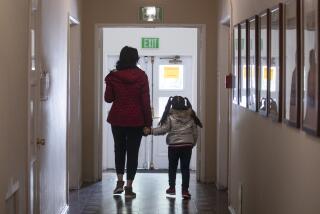Homeless Women Find Promise of New Dawn at Daybreak Shelter
- Share via
They sounded like women everywhere.
“All I’ve been doing all day is eating,” said one, picking at her rocky road ice cream. “Monday I’m going on a fruit and vegetable diet.”
“Does anyone have any lotion?” asked another. “My skin is so dry.”
But these women are bag ladies. They sleep in gas station bathrooms and under bushes in parks. Their skin is dry because of constant exposure to the elements.
And because they were afraid of going hungry, they stuffed themselves one recent morning on food provided by Daybreak, a new daytime shelter in Santa Monica for homeless women.
The aim of the 7-week-old shelter is to make life more comfortable for homeless women who are mentally disabled. Sponsored by the Ocean Park Community Center and open for 6 1/2 hours on weekdays and 3 1/2 hours on weekends, the program is funded by the city of Santa Monica and by private donations. A 10-kilometer walk to raise money is scheduled for June 7.
Opened March 25
Since the shelter opened March 25 on Ocean Avenue near Palisades Park, more than 39 homeless women have drifted in to eat a hot meal, take a shower and rest on a cot. “I’m so tired,” Mary said, dropping her satchels near the entry of the tiny two-room apartment. “I didn’t sleep a wink last night after six roaches came at me.” (To protect their anonymity, the women’s real names have not been used.)
Thirty-nine clients may not seem like many, but it is more than the shelter’s counselors dreamed they would see in the first few months.
“We thought it would take quite a while for people to trust us and each other,” said Russell Lane, operations manager for Daybreak, as she set out breakfast pastries donated by a local restaurant. “Some of these women have been institutionalized (for mental illness) and have led very isolated lives on the street.”
The mentally ill have lacked resources since funding for state mental hospitals was cut in the 1970s, reducing the hospitalized population from 35,000 to about 5,000, said Jill Halverson, founder and director of the Downtown Women’s Center on Skid Row, the prototype for Daybreak. Daytime shelters where women can be treated by visiting psychiatrists and get help filling out government paper work are sorely needed, she said.
Mentally ill homeless women risk being raped, robbed and assaulted, according to Halverson.
At Daybreak, four women in their 30s and 40s were enjoying cinnamon rolls and fresh pineapple when Sally came in. Like the others, she appeared surprisingly well-groomed with clean gray slacks and a white shirt, thanks to the shelter’s bathing and laundry facilities. But there was a black mark under her eye that her makeup did not completely disguise.
“This drunk punched me three days ago in the alley in broad daylight,” Sally said. “Then he ordered me to come with him and a friend to the beach, but on the way I ran into a store.”
Sally described the man and told the other women that she was going to press charges because “he has a record and he’ll just do it to someone else if I don’t.” She said she sleeps in a public restroom with several other women because “there is protection in numbers.”
One Woman Writes
While Sally and the other women talked in the kitchen, Ann and Chris used the shelter’s other room. Chris sat on the couch, writing in a notebook and listening to the radio. Ann curled up under a blanket on one of the shelter’s cots.
Both women suffer from acute mental illness, according to the shelter’s counselors. Ann looks like a stereotypical bag lady. She is overweight with dirty, knotted long hair and mismatched clothes. Chris is withdrawn except for periodic outbursts.
The public’s fear of the mentally ill delayed the shelter’s opening for two years, according to Betty Macias, Daybreak director. She said that every time they thought they had found suitable quarters, neighbors objected.
The center finally found space in a low-income housing project. To move in, the shelter staff had to agree not to allow clients to use the tenants’ outdoor patio. Relations have been smooth except for one complaint that counselors were bringing visitors out on the patio to show them the ocean view, a practice that Lane says has stopped.
Beth, a client, complains that the tiny shelter doesn’t have storage facilities. “I’m tired of walking around with all this stuff,” she said. “It just shouts ‘homeless,’ and no one will hire you.”
But finding jobs “in a major American corporation” for these women is not the purpose of daytime shelters, Halverson said.
“We measure success in terms of little miracles here,” she said. “I’m pleased when someone bathes or leaves their shopping cart outside or takes their medication.”
More to Read
Sign up for Essential California
The most important California stories and recommendations in your inbox every morning.
You may occasionally receive promotional content from the Los Angeles Times.










